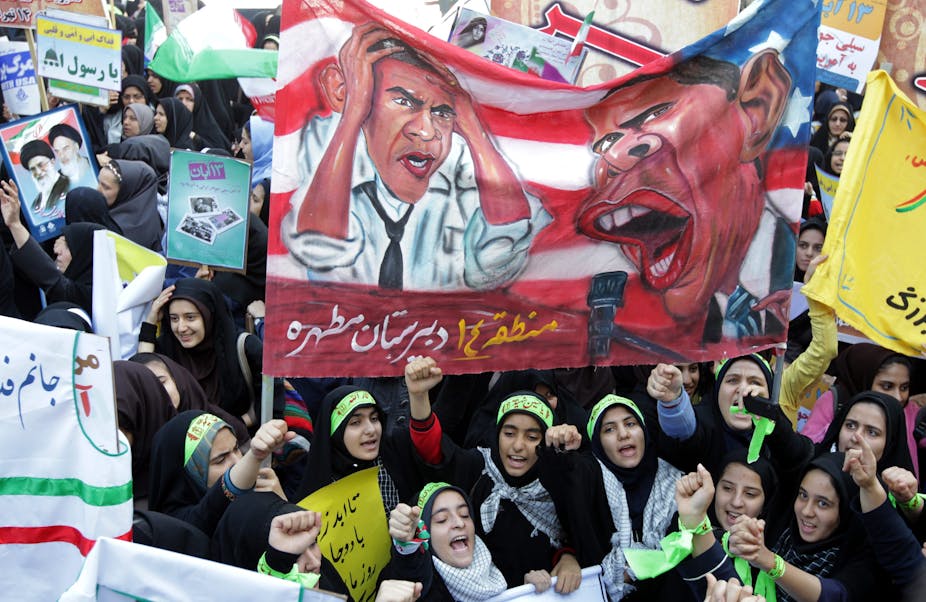The re-election of Barack Obama to a second term will have significant ramifications for an America struggling with economic and social difficulties. But will it have the same impact on residents of the Middle East? What will four more years of Obama mean for the chimera of peace in the region?
In their first term, presidents tend to have one eye constantly focused on winning a second term. That means pushing through their pet legislation early on and then keeping a steady hand on the tiller in the last year or so. But it’s when they do win that second term that they start to relax and get creative. It’s also when the “L word” crops up – legacy.
Legacy politics
A second-term president will start to think of how he will be remembered by history and inevitably develop the ambition of leaving the world a better place. For Ronald Reagan it was the defeat of communism. For George W. Bush it was the defeat of terrorism and the ousting of Saddam. For Bill Clinton it was keeping his trousers zipped and surviving impeachment.
The question is, what will Obama choose? America has plenty of problems at home, and it may well be that the president will place more focus there than in overseas adventures. Barring some sort of 9/11 type outrage, a major overseas military intervention seems unlikely.
The “bunny in the headlights” response from America over the Arab Spring and the ongoing Syrian apocalypse has been the most obvious demonstration of the domestic focus of Obama’s first term. In part two, it’s doubtful that he will be able to do much to address the instability in the fledgling democracies or sort out the mess in Damascus. And if he’s smart, he won’t even try. In all the metaphors of ships and reefs, Syria is like a mighty lighthouse blinking out a message that clearly says “keep away”. Plus it’s easy to blame the Russians and Chinese for not making progress.
The Persian gambit
So if Obama does want to create some sort of legacy in the Middle East, it is most likely going to be centred on Iran. Snipping the red wire on the nuclear doomsday device is the obvious thing, but a far nobler ambition would be bringing Tehran back into the community of nations so that everyone can live in peace and harmony.
It sounds implausible. But it’s already happening.
The Israeli newspaper Yediot Ahronot reported last week that secret negotiations between America and Iran had occurred in Bahrain. Not only that, but they had been going on for months. The jury is still out on the veracity of that story, but some sort of diplomatic approach would have been likely. The sanctions on Iran have hurt the country badly, and it’s likely that economic concessions will be the preferred bargaining chips there. The beauty of secret negotiations is that the media pressure is removed and the parties don’t feel the need to paint themselves into a corner. The rapprochement of Libya in 2003 followed this pattern of hush-hush talks and economic dickering.
One milestone to co-operation will come in June 2013 when Iran holds its own presidential elections. Mahmoud Ahmadinejad will be stepping down, having served out his second term. Foreign policy in Iran is really controlled by the Supreme Leader and his various counsellors, but with Ahmadinejad out of the way, everyone can save face. A new president may be the sock puppet tasked with running a more conciliatory foreign policy. Lightening up on the “death to Israel” stuff and turning off the centrifuges will be steps along the way.
There is a time limit on negotiations though. If Iran keeps stonewalling, the hawks will be calling for more direct action. But both sides know that the use of force is out. Even Netanyahu’s own military commanders shut him down when he asked them to plan a strike. But if talks go on too long Iran will continue to implode economically. That’s bad for the ayatollahs because poor and hungry people get desperate. But it’s also bad for the West because it’s easy for the ayatollahs to direct some of the blame and hate outwards against the Zionists, Imperialists, Crusaders and so on, thus making reconciliation harder.
For Obama, the pieces are definitely there on the table. It’s just a matter of whether he wants to play the game.
The Clinton factor
Hilary Clinton’s impending resignation from the cabinet is one factor that could cause a significant change in American relations with the Middle East. Clinton, a staunch friend of Israel, got through a lot of business on behalf of her boss.
Under her, the relationship between Israel and America has never been closer and more productive, especially in terms of military and intelligence co-operation. But of course that closeness comes at the price of alienating the Arabs. Whoever succeeds Clinton will have the same tightrope to walk. Plus there is always the possibility that Hilary will crop up as a candidate for the White House herself in 2016.
So in the next four years, as always, the Middle East will throw up a series of challenges to the American President, if only in the context of energy security. But when Obama takes the oath at his second inauguration in January, it is likely that the region will be consuming far less of his attention than that of his predecessor George W. Bush when he stood on the Capitol steps for his return to office in 2005.

